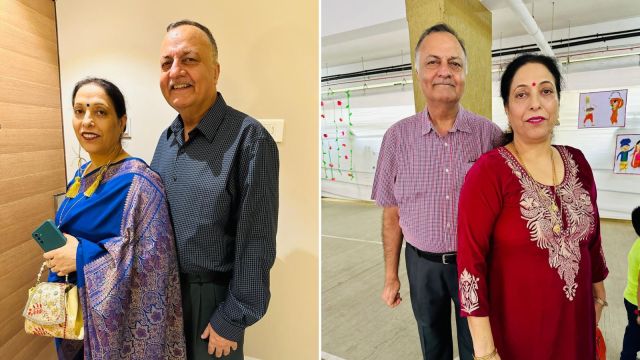In his early 40s, Ravinder Sus, who was working at a State Bank of India branch in Jammu, had spells of dizziness, blurry vision and frequent urination. A check-up showed elevated blood sugar levels. But since he was a sportsman and had no family history, he thought he could roll back his numbers with exercise, limiting dietary sugar and drinking herbal supplements like karela (bitter gourd) juice. He didn’t follow up, ignored medication and thought he was in control. But almost 20 years later, he collapsed one day with acute kidney failure and needed an immediate kidney transplant.
“I made a big mistake by ignoring my condition and becoming complacent,” says Sus, who changed his life around after the transplant, even winning the silver medal in a table tennis championship for organ recipients. “If only I had been as disciplined before, things would not have come to such a pass,” he adds.

Prolonged, uncontrolled diabetes can lead to severe health complications, affecting various organs and systems throughout the body. There is an increased risk of heart disease, stroke, kidney failure, vision loss, nerve damage and foot problems. Yet many older adults in India tend to ignore managing their diabetes, a fact borne out by the latest study in The Lancet Global Health journal, which says that two out of five people with diabetes (or 40 per cent) were unaware of their condition in 2019. At least one in five people aged 45 and older had diabetes in India, which amounts to 50.4 million individuals. Dr T V Sekher, professor at the International Institute for Population Sciences, Mumbai and one of the principal authors of the study, says, “Only half of the affected people are aware of their condition and even fewer achieve targets for blood sugar control, blood pressure control and use of lipid-lowering medications.”
Story continues below this ad
Dr Tarun Jeloka, senior nephrologist and transplant expert with Manipal Hospitals, Pune, says what he had seen in Sus is not unusual. “Diabetes is the most common cause of kidney failure,” he adds.
WHY DISCIPLINE SHOULD BEGIN WITH DIABETES DIAGNOSIS
Even after being diagnosed with diabetes, Sus refused to acknowledge the early warning signs. “I was an avid cricketer, a state-level table tennis player and with no family history, I thought I could manage a rollback of my blood sugar levels with a clean diet. I eliminated sugar from my tea and other meals, overlooked follow-ups, doctor advisories and tests,” he says.
As he worked his way up the ladder to become chief manager at his bank, an increased workload meant longer sedentary hours and a decline in physical activity. Sus became overweight at 85 kg. Still he never got himself checked. However, fearing that his blood sugar levels could be rising, he took to drinking karela (bitter gourd) juice and mixed methi (fenugreek) powder in his food. “I walked now and then but there was no major change in my lifestyle. Besides, I was a chain smoker,” says Sus.
Dr Jeloka points out that heavy smokers are at an increased risk of developing Type 2 diabetes. Studies show smokers are 30-40 per cent more likely to develop diabetes compared to non-smokers. Smoking can interfere with the way your body uses insulin, leading to insulin resistance. It can cause inflammation and damage cells, making them less responsive to insulin. Smoking can lead to increased belly fat, another risk factor for diabetes. “Worse, if you already have diabetes, smoking makes it harder for you to manage your blood sugar levels and can worsen complications like nerve damage (neuropathy), kidney problems (nephropathy) and eye problems (retinopathy),” adds Dr Jeloka.
THE DAY EVERYTHING CRASHED
Story continues below this ad
Sus retired in 2016 and moved to Pune along with his wife Anjali to live with their son. A routine test indicated elevated blood sugar levels. He ignored the report a second time, thinking he could work around it since he had no other major health issues. Two years later, in 2018, Sus collapsed at a wedding reception, sweating profusely and complaining of palpitations. An investigation revealed that both his kidneys had been completely damaged. “At that time, I was 62, gearing up to enjoy a retired life. Normal creatinine levels are generally between 0.7 to 1.3 mg/dL but mine had shot up to 8 indicating severe kidney dysfunction,” he recalls.
What followed were long and exhausting dialysis sessions. “With a severely restricted life, I felt very low and had no appetite,” says Sus, later agreeing to a kidney transplant. Wife Anjali became his donor but not without some problems. Their blood groups did not match and hence Dr Jeloka went ahead with a blood group mismatch transplant. This can lead to complications because the recipient’s body may produce antibodies that attack the donor’s blood cells. “The risks are comparatively higher but we managed a successful transplant. The success rate is close to 95-96 per cent,” adds Dr Jeloka.
“Anjali’s rib had to be cut so that the kidney could be extracted. She also took a longer time to recover from the surgery,” says Sus, who needed 40 stitches post-transplant. He remained in isolation for a while to avoid any infection and then had to prevent transplant-induced diabetes by taking four insulin shots daily. “Post-transplant diabetics require insulin to keep their blood sugar levels under control and need monitoring. About 20 per cent transplant patients can develop diabetes,” says Dr Jeloka.
A SECOND SHOT AT LIFE
The challenge in management of diabetes is the need for regular monitoring, persistent exercise, healthy diet and medicines. Additional challenges include missing out on subtle signs of a stressed kidney like swelling in the legs, increased frequency of urine, loss of appetite, fatigue and so on.
Story continues below this ad
As Sus was recovering, he came across an advertisement for the National Transplant Games by the Mumbai-based Narmada Kidney Foundation. “It rekindled my sportsman spirit and fuelled my determination. I participated in the table tennis competition and won a silver medal.” He also connected with Blue Circle Diabetes Foundation and took part in awareness talks. “I chose to share my story so that anyone newly diagnosed with diabetes or at risk of the disorder does not make the same mistake I did – neglecting my health and ignoring my condition,” says Sus.
With renewed determination, he has turned his life around. His story is a reminder of what can happen when diabetes is taken lightly and the incredible transformation possible when it is managed with discipline and care. Although Sus was hospitalised twice with Covid-19, he got back on his feet. “I have suffered, but you don’t have to,” he says.

































